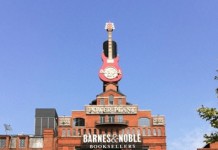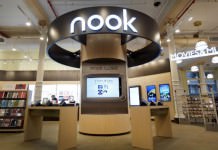 Editor’s Note: here is an opinion piece from Alex Sanchez. It’s appropriate to print it now as the big announcement will be tomorrow. Paul Biba
Editor’s Note: here is an opinion piece from Alex Sanchez. It’s appropriate to print it now as the big announcement will be tomorrow. Paul Biba
I am like most of you out in the blogosphere awaiting the arrival of the Barnes and Noble e-reader with bated breath. The amount of change that has occurred over the last year in regards to e-books and their dedicated devices has been simply stunning. This latest device represents a quantum leap if you will in this tumultuous market. It however is one that I am not sure will succeed in the long run for the following reasons:
1.) The early consensus has been that B&N is insisting on using a “copier and cartridge” strategy for e-books. This approach has not been followed by Amazon or Sony for a singular glaring reason-it is a strategy that is not sustainable. Presently there are customers who are putting up heavy resistance to paying more than $9.99 per e-book-not to mention those who refuse to pay more for an e-book than a print book. The market is saturated with free or low cost e-content and I do not see how B&N can actually advocate a price for content that is significantly higher than the current equilibrium price that Sony and Amazon have standardized across the e-book market.
2.) There is very little reason to believe that B&N will follow a “DRM free” approach to selling e-books. The market is in desperate need of a retailer who will force publishers to sell their content in much the same way that Amazon sells MP3 music files “DRM free”. B&N could very well be that spoiler but there has been little indication as of late that it’s willing to play the role.
3.) There new device for all of its bell and whistles may not be able to pass most peoples durability expectations. Current I-phone and e-reader users have a well placed obsession with protecting the screens on their beloved high tech devices; this B&N device will only increase this anxiety by combining two screen technologies that are remarkably sensitive to cracking/damage.
4.) Lastly, there is the existing notion that B&N has less than stellar customer service. It is not something that I as a customer can say I have had a problem with; but there are those out there who will undoubtedly agree with my assertion regarding this issue. If there currently is a belief that this company can be difficult to deal with regarding smaller purchases I can’t imagine this reputation being anything other than a hindrance in their new ambitious endeavor.
For all of these aforementioned reasons I must clearly state that I am excited about the prospect of a new device, but am dubious as to it ultimate viability. Future buyers beware as Martha Beck once brilliantly opined “Any transition serious enough to alter your definition of self will require not just small adjustments in your way of living and thinking but a full-on metamorphosis.” Amazon by introducing such elements as competitive pricing, synching of devices, relatively free wireless service, and now worldwide service has remarkably changed the way we think about reading, and subsequently often times even the way that we read. In this authors humble opinion, Sony has up till this point failed to grasp this fundamental concept and B&N may be embarking on its own e-book version of the “Donner family” journey. Except in this version the consumer may be eaten alive by erratic efforts on the part of B&N to make a deeply flawed pricing strategy work. I for one will wait to see if they have made all the right decisions before I saddle up and hop on board.


































If this does turn out to be B&N’s strategy for e-books it will be sad, very sad, and doomed to failure.
However, there are other e-book business models that are even sillier, and even more doomed. Like this one I just stumbled across:
http://tinyurl.com/yk4nxhn
I had to read it twice to be sure they were serious. That anyone could so totally miss the whole idea of e-books and the internet is beyond belief.
Hi, nice article…
What is a “copier and cartridge” strategy ?
Regards,
David.
@David S: I don’t see what’s so “silly” about this idea, provided people can still buy the books online as well. This idea has been proposed by other bookstores as well: It gives the consumer a place to go and ask questions of a live person, and possibly see the book in printed form before they buy the e-book. I know I’d spend more time in local bookstores if I could buy their content as e-books after I browse through it.
@David: I believe the strategy is about selling the copier at a loss, and selling the ink cartridges at high prices to make up the profit. Personally, I disagree here: I don’t see any of these strategies as “giving away” e-book readers at a loss, nor charging exhorbitant rates for all e-books… in fact, I see the opposite, charging high rates for readers, and going market prices for most e-books.
There appears to be a bit of a misunderstanding on the “higher ebook prices” aspects of the B&N ebook store. It’s not B&N that is driving it; it is the publishers. They are the ones pushing for the unsustainable content prices. And, unlike Amazon, which is a broad spectrum *retailer* (their main competitor is WalMart), B&N is strictly a content vendor. They are at the mercy of the publishers; they can’t sell many ebooks at loss-leader prices unless the publishers give them preferential treatment. Amazon may or not be doing it (I’m skeptical myself–I think the publishers protest too much) but there is no question they *can* do it indefinitely. B&N can’t. If you don’t like B&N ebook pricing, blame the publishers.
Whether B&N’ll try to justify their prices with “liberal” DRM restrictions or just simply pretend they aren’t higher (their original approach) remains to be seen but odds are that anything short of zero-DRM will have no significant impact other than, maybe, encouraging greater DRM-stripping.
Also, I wouldn’t be so sure that the reader itself, the Nook, is being sold at a loss. The expected price merely matches Amazon and is more expensive than most of the second tier gadgets, most of which can readily plug in to the B&N ADE ebook ecosystem. All these gadgets have similar technology inside and are built using more or less the same components and it shows in both the performance and the price. Nook is competitively priced but it is hardly priced as a true loss leader. Not even the Sony 300 can make that claim.
Finally, everybody is so focused on “killing Kindle” they seem to forget there are other players out there, other markets, other platforms. And that the real war isn’t between B&N and Amazon but between the publishers and the consumers over the perceived value and baseline pricing of ebooks; whether ebooks are a premium product like hardcovers or a commodity like paperbacks; whether pricing will be cost-plus or soak-the-reader.
We’re not bystanders, we’re participants voting with our wallets.
Worth remembering: Amazon’s $9.99 baseline ebook pricing is no bargain. Yet the publishers expect us to go higher. How’s a $12 baseline strike you? $15? Does anybody think prices would go down and DRM vais if Kindle ceased to exist?
Let’s not lose the forest for the trees; the (unlikely) death of Kindle will only result in (permanently) higher ebook prices for everybody and a stunting of the industry, which is what the publishers want. You don’t have to be a fan of Amazon to realize they are the only thing standing between consumers and truly obnoxious pricing.
Let’s stick with the basics, shall we? Competition is good; more is better (Welcome B&N), less is bad (Let’s hope Sony stays).
@Felix, don’t forget there are a lot more than just the Big Pub players involved here: Small publishers are showing more willingness to sell at lower prices, and if the Big Pubs club each other into submission, the influence of the small pubs and new guys on the block will carry some influence.
This goes for Amazon, B&N, Sony and anyone else who thinks the game is being played only by 3-4 outlets for a bunch of dedicated devices only. The e-book market is much more varied than that, and the likely result of the Big Boys waging war with each other might be for everyone to just get out of their way and deal with the little guys instead. So far, I have felt little incentive to buy e-books from the Big Pub sites, and I have no interest in buying a Kindle. These “price wars” will hurt them far more than they will hurt me.
@Mr Jordan: Agreed. No argument there.
I have pointed out repeatedly that the publishing houses are just too stuck up on protecting their 19th century business model to realize they have an alternative to letting Amazon or Adobe take over their business.
Instead of fretting about Amazon or whoever disintermediating them, they should be out bypassing Amazon and B&N and Walmart.
All they need to do is follow Baen’s example and set up their own ebook stores. Take out Amazon’s slice and you can undercut them *and* deliver better royalties to your authors and better profits to your shareholders. Support all formats and then you don’t care who wins the hardware war.
Of course, that requires taking note of what century we live in and actually delivering some kind of added value to your authors and readers…
The game is early; ebooks are in a trasitory phase. Some publishers will successfully navigate the transition and flourish. Others will seek to stem te tide of change and flounder.
Should be interesting to see who is still around in five years…
I am grateful for all of the constructive feedback that I have received. When it comes to the “Nook” I must admit that it has really found a soft spot in heart. It is an absolutely gorgeous machine, only time will tell if it makes a significant impact. Thanks Steve for explaining the “Copier and cartridge” concept/strategy in a very clear and concise way.